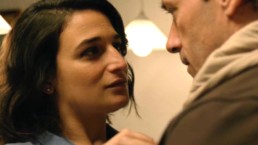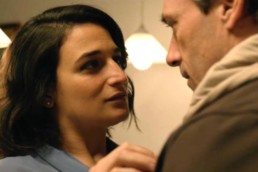‘Aardvark’ Review: The Psychology of Redemption
No one knows why we do the things we do. Not even us.
It is a common practice in independent filmmaking for a director to tap on the shoulders of their friends and invite them to collaborate on something they believe in.
In this method, those involved can often find a certain level of comfort amongst each other, usually resulting in strong performances and quite capable directing. Aardvark, director-writer Brian Shoaf’s darkly mysterious and touching drama starring close friend and producer Zachary Quinto, his friend Jenny Slate, and her old friend John Hamm, pays testament to this formula and allows for this new director to play with themes that ring true on a subconscious and primal level.
The film observes the intertwining relationships of a disturbed yet endearing social outlier, Josh Norman (Quinto), his romantically challenged therapist, Emily (Slate), and his estranged older brother, Craig (Hamm), all of whom appear to be very lonely on a deep internal level. With a slight sprinkling of the fantastic, audiences see the symptoms of Josh’s psychosis which manifests itself in subtle lunacy. To endure the loneliness of being distanced by his older brother, Josh’s mind creates a world in which his brother often comes to him “in character” or disguise. These delusions are what keep Josh close to a brother whom he never sees.
This plays as unsettling to the point of being darkly comedic, at first. The audience sees – through Josh’s perspective – Craig as the homeless woman asking for cigarettes or the police officer who convinces Josh to try stealing a bike. But eventually this has more crippling effects on its host, and the hallucinations make it impossible for Josh to ever trust any person around him, including a romantic, mysterious woman named Hannah (Sheila Vand).
The three main characters are haunted by the guilt of foolish adolescent malice made permanent by the nature of time…
Jenny Slate’s wonderfully subtle and reserved performance as Emily gives a strong juxtaposition to Josh’s mental unwinding and is the driving force of the narrative. Though she attempts to help Josh, forces of chance and romance take control of her life, causing events to take turns that she never expected. These events climax in breaking professional and moral principle by sleeping with the brother of her client, and compromising his trust. From sex to shame to self-discovery, her remorse and empathy are full to the brim of accessible pathos and hers is the most rewarding character arch in the narrative. Eventually, she is the cause of the happy ending and redemption of Craig, who could never forgive himself for the traumas he inflicted on Josh.
There’s something about the pacing and way in which information is revealed in this particular feature that makes it eerily relatable yet at the same time… I have no idea what is going to happen, and inevitably is Shoaf’s direct intention. He commented that “We were always striving for a sense of familiarity, of nostalgia, but never anything you could put your finger on exactly.” The three main characters are haunted by the guilt of foolish adolescent malice made permanent by the nature of time, the cold loneliness of feeling unloved by everyone around you, and the fear of truly not understanding why we find ourselves being treated to such pain and suffering. All of these themes are accessible to almost every human being, but that last one, in particular, lends itself to more than that.
Shoaf, with the facilitation of a cast on top of its game, is able to remind his audience that as a living thing, just as the aardvark the film is named for, much of what happens in life is beyond control and as such, we live in a large realm of innocence in having no way of knowing why things happen. We must be able to forgive ourselves for committing crimes of immorality due to ignorance in order to find redemption; a pretty powerful message from a debut director with a great deal of promise, and good friends to work with. Keep your eye on Brian Shoaf.
89 minutes. ‘Aardvark’ is rated PG-13 for mature thematic issues, language, some sexuality, and violence. Opening this Friday at Laemmle’s Playhouse 7.
Ryan Denman
Ryan is a contributing writer for CINEMACY.


